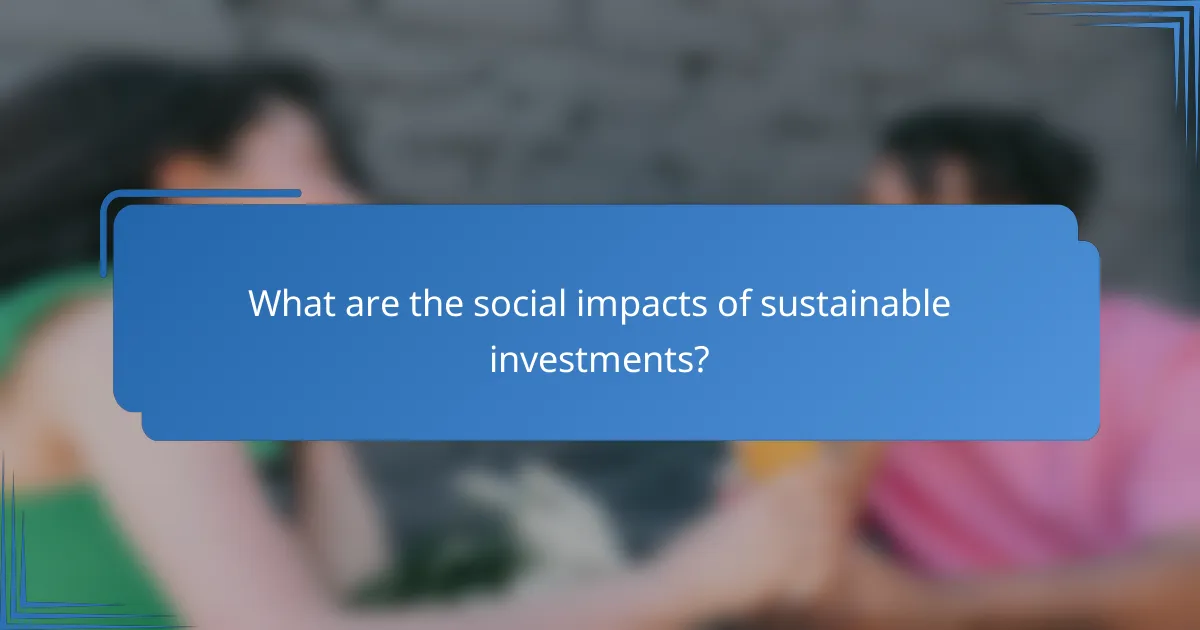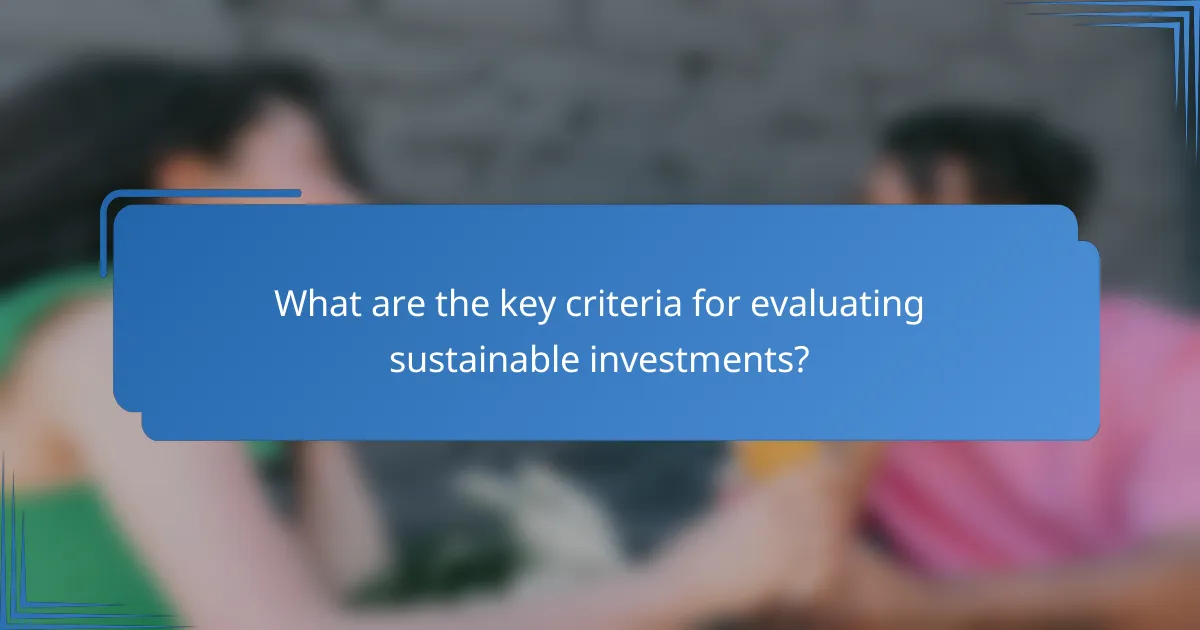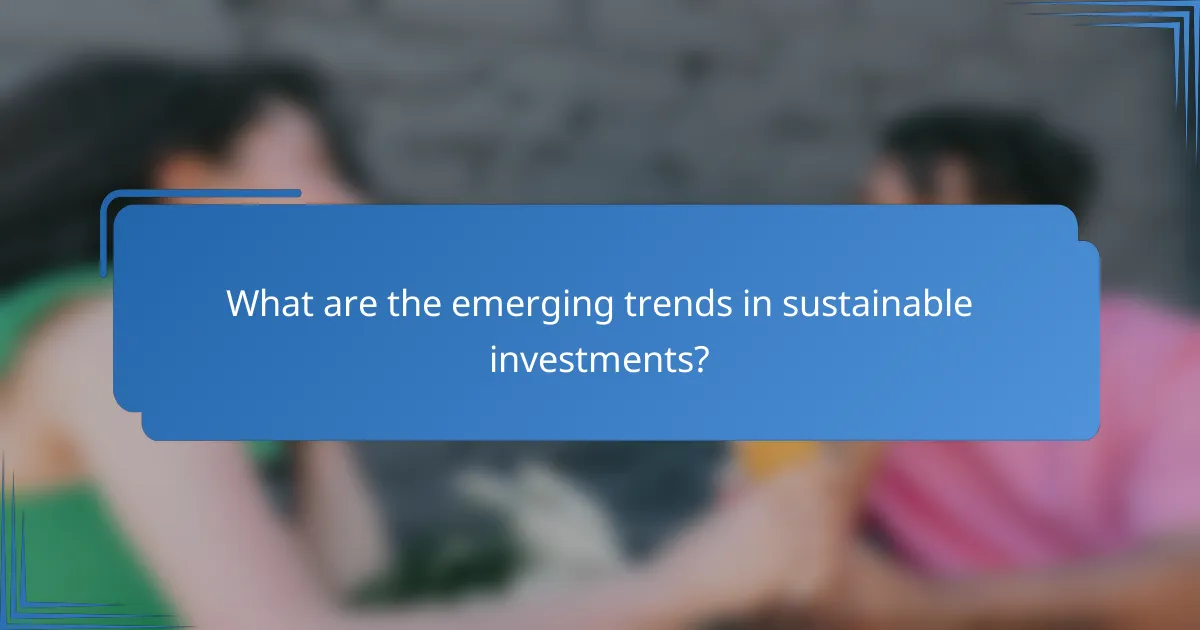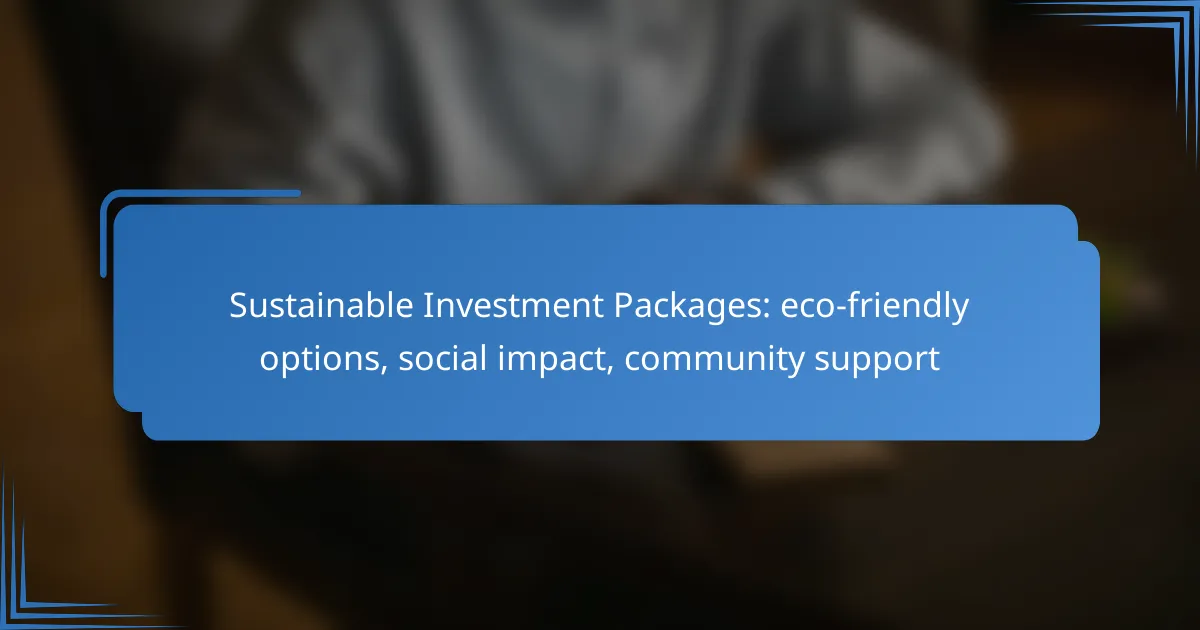Sustainable investment packages offer a unique opportunity to support eco-friendly initiatives while generating potential returns. By focusing on environmental health, social responsibility, and community support, these packages direct capital towards projects in renewable energy, sustainable agriculture, and green technology. Investing in these options not only promotes economic growth but also enhances community well-being and fosters inclusivity.

What are the best sustainable investment packages in Australia?
The best sustainable investment packages in Australia include options that focus on environmental, social, and community benefits. These packages allow investors to support eco-friendly initiatives while potentially earning returns on their investments.
Green Bonds
Green bonds are fixed-income securities specifically earmarked for funding environmentally friendly projects. Investors can support initiatives such as renewable energy, energy efficiency, and sustainable waste management. In Australia, these bonds often offer competitive interest rates, making them an attractive option for eco-conscious investors.
When considering green bonds, evaluate the issuer’s credibility and the specific projects funded. Look for bonds that align with recognized standards, such as the Green Bond Principles, to ensure your investment has a genuine environmental impact.
Social Impact Funds
Social impact funds focus on generating positive social outcomes alongside financial returns. These funds typically invest in businesses or projects that address social issues, such as affordable housing, education, and healthcare. In Australia, these funds are gaining popularity as investors seek to make a difference while earning a return.
Before investing in social impact funds, assess the fund’s objectives and track record. Ensure that the fund manager has a clear strategy for measuring social impact, as this will help you understand the potential benefits of your investment.
Community Investment Notes
Community investment notes are debt instruments that provide funding for local community projects, such as small businesses or affordable housing initiatives. These notes allow investors to support their communities while earning a modest return. In Australia, community investment notes can be a powerful tool for fostering local development.
When considering community investment notes, research the issuing organization and its impact track record. Look for notes that offer transparency in reporting and a clear plan for how funds will be utilized to benefit the community.
Renewable Energy Projects
Investing in renewable energy projects involves funding initiatives that produce energy from sustainable sources, such as solar, wind, and hydroelectric power. These projects often provide long-term returns and contribute to reducing carbon emissions. In Australia, the renewable energy sector is rapidly growing, presenting numerous investment opportunities.
Evaluate the project’s feasibility and the developer’s experience before investing. Consider factors such as government incentives, regulatory support, and the project’s alignment with Australia’s energy transition goals.
ESG Mutual Funds
ESG mutual funds invest in companies that meet specific environmental, social, and governance criteria. These funds allow investors to support businesses that prioritize sustainability and ethical practices. In Australia, ESG mutual funds are becoming increasingly popular as investors seek to align their portfolios with their values.
When selecting ESG mutual funds, review the fund’s criteria for selecting investments and its performance history. Look for funds that provide clear reporting on their ESG impact, ensuring your investment aligns with your sustainability goals.

How do sustainable investment packages support eco-friendly initiatives?
Sustainable investment packages play a crucial role in promoting eco-friendly initiatives by directing capital towards projects that prioritize environmental health and social responsibility. These packages often focus on renewable energy, sustainable agriculture, and green technology, fostering a positive impact on both communities and the planet.
Funding for Renewable Energy
Funding for renewable energy projects is a key component of sustainable investment packages. These investments typically support solar, wind, and hydroelectric power initiatives, which help reduce reliance on fossil fuels. Investors can expect to see returns that align with the growing demand for clean energy solutions.
When considering investments in renewable energy, it’s essential to evaluate the project’s location, regulatory environment, and potential for scalability. For instance, solar farms in sunny regions may offer higher efficiency and returns compared to those in less favorable climates.
Support for Sustainable Agriculture
Support for sustainable agriculture is another vital aspect of sustainable investment packages. These investments aim to enhance food security while minimizing environmental impact through practices like organic farming and permaculture. By investing in sustainable agriculture, investors contribute to healthier ecosystems and local economies.
Investors should look for opportunities that promote regenerative practices, such as crop rotation and reduced chemical use. Engaging with local farmers and cooperatives can also provide insights into the most effective and sustainable methods, ensuring that investments yield both financial and social returns.
Investment in Green Technology
Investment in green technology is essential for advancing eco-friendly initiatives. This sector encompasses innovations that improve energy efficiency, reduce waste, and promote sustainable practices across various industries. Investing in green technology can lead to significant long-term benefits as businesses increasingly prioritize sustainability.
When exploring green technology investments, consider the potential for disruption and market demand. Technologies such as electric vehicles, energy storage solutions, and waste-to-energy systems are gaining traction and can provide lucrative opportunities for investors committed to sustainability.

What are the social impacts of sustainable investments?
Sustainable investments can significantly enhance social outcomes by promoting economic growth, improving community well-being, and fostering inclusivity. These investments often prioritize environmental stewardship and social equity, leading to positive changes in local communities.
Job Creation in Local Communities
Sustainable investments often lead to job creation in local communities by funding green projects and businesses. For instance, renewable energy initiatives can generate numerous positions in installation, maintenance, and management, benefiting both the economy and the environment.
Investors should consider the types of jobs created, focusing on those that provide fair wages and opportunities for advancement. Engaging with local stakeholders can help ensure that job opportunities align with community needs.
Funding for Education and Health Initiatives
Many sustainable investment packages allocate funds to education and health initiatives, which are crucial for community development. These investments can support schools, vocational training programs, and healthcare facilities, leading to improved quality of life and economic stability.
Investors can enhance their impact by partnering with local organizations to identify specific needs. This collaboration ensures that funding addresses the most pressing issues, such as access to education or healthcare services.
Support for Marginalized Groups
Sustainable investments often prioritize support for marginalized groups, helping to reduce inequality and promote social justice. By directing funds towards initiatives that empower these communities, investors can foster inclusivity and resilience.
To maximize impact, investors should focus on projects that provide resources and opportunities for historically underrepresented populations. This could include funding for minority-owned businesses or programs that promote gender equality in the workforce.

How to choose the right sustainable investment package?
Choosing the right sustainable investment package involves evaluating the social and environmental impact alongside financial returns. Focus on packages that align with your values and financial goals while considering the potential risks involved.
Assessing Impact Metrics
Impact metrics are essential for understanding how your investment contributes to sustainability goals. Look for established frameworks like the Global Reporting Initiative (GRI) or the Sustainability Accounting Standards Board (SASB) that provide standardized metrics for measuring social and environmental outcomes.
Common metrics include carbon footprint reduction, community engagement levels, and job creation in underserved areas. Assessing these metrics helps ensure that your investment aligns with your commitment to social responsibility.
Evaluating Financial Returns
Financial returns on sustainable investments can vary widely, often ranging from modest to competitive compared to traditional investments. Analyze historical performance data and projected returns to gauge the viability of the investment.
Consider the investment’s time horizon; some sustainable options may take longer to yield returns but can provide significant long-term benefits. A balanced approach, combining both short-term and long-term investments, can optimize your portfolio.
Understanding Risk Factors
Risk factors in sustainable investments can include market volatility, regulatory changes, and shifts in consumer preferences. It’s crucial to assess how these risks may impact your investment’s performance.
Conduct thorough due diligence on the companies or projects you are considering. Look for those with strong governance practices and a proven track record in sustainability to mitigate potential risks effectively.

What are the key criteria for evaluating sustainable investments?
Key criteria for evaluating sustainable investments include assessing their environmental impact, social responsibility, and governance practices. These factors help determine how well an investment aligns with sustainability goals and its potential for positive societal and ecological outcomes.
Environmental Impact
When evaluating the environmental impact of an investment, consider its carbon footprint, resource usage, and waste management practices. Investments in renewable energy, sustainable agriculture, or eco-friendly technologies typically score higher in this area.
Look for companies that adhere to recognized environmental standards, such as ISO 14001, which focuses on effective environmental management systems. Additionally, consider the investment’s contribution to biodiversity and ecosystem preservation.
Social Responsibility
Social responsibility involves assessing how an investment affects communities and stakeholders. This includes evaluating labor practices, community engagement, and the overall social impact of the company or project.
Investments that support fair trade, diversity, and inclusion initiatives often demonstrate higher social responsibility. Check for certifications like B Corp, which signifies a commitment to social and environmental performance.
Governance Practices
Good governance practices are crucial for sustainable investments, as they ensure transparency, accountability, and ethical behavior within organizations. Key aspects include board diversity, executive compensation, and shareholder rights.
Investors should look for companies with strong governance frameworks, such as adherence to the OECD Principles of Corporate Governance. Regular reporting and stakeholder engagement are also indicators of good governance practices.

What are the emerging trends in sustainable investments?
Emerging trends in sustainable investments focus on eco-friendly options, social impact, and community support. Investors are increasingly prioritizing environmental, social, and governance (ESG) criteria, leading to innovative financial products that align with sustainable practices.
Eco-friendly investment options
Eco-friendly investment options include green bonds, renewable energy funds, and sustainable real estate. These investments typically fund projects that reduce carbon footprints or promote sustainable practices, such as solar energy or energy-efficient buildings.
Investors should consider the potential returns and risks associated with eco-friendly options. While some may offer competitive returns, others may be more volatile or subject to regulatory changes. Researching the underlying projects and their long-term viability is crucial.
Social impact investments
Social impact investments aim to generate positive social outcomes alongside financial returns. These investments often target sectors like affordable housing, education, and healthcare, focusing on improving community well-being.
When evaluating social impact investments, consider the measurable outcomes and the alignment with personal values. Investors should look for funds that provide transparency on their social impact metrics and track record.
Community support initiatives
Community support initiatives involve investments that directly benefit local communities, such as community development financial institutions (CDFIs) or local business funds. These initiatives often provide capital to underserved areas, fostering economic growth and social equity.
To engage in community support investments, investors should assess the specific needs of the community and the potential impact of their contributions. Collaborating with local organizations can enhance the effectiveness of these investments and ensure they address real challenges.
